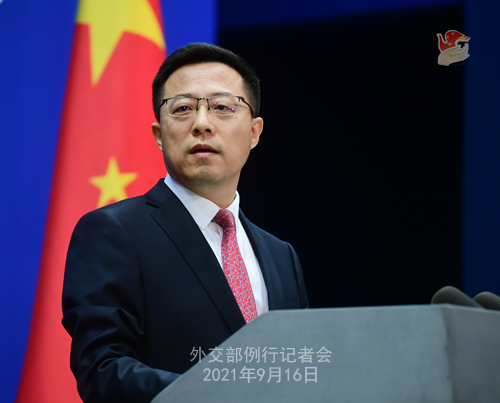
CCTV: This year marks the 20th anniversary of the establishment of the Shanghai Cooperation Organization (SCO). Against this backdrop, President Xi Jinping will attend the commemorative summit and deliver important remarks. What is China's expectation for this summit?
Zhao Lijian: This year marks the 20th anniversary of the SCO. Over the past two decades, the member states, following the Shanghai Spirit, have transcended differences in social systems, histories and cultures, and successfully found a new type of cooperation and development path for regional organizations. They have played active roles in regional and international affairs, and made vital theoretical and practical exploration for building a new type of international relations and a community with a shared future for mankind.
The impact of COVID-19, compounded with major changes unseen in a century, has brought complex and profound changes to international and regional situations. This means the SCO shoulders more important responsibilities in defending regional security and stability and promoting development and revitalization of the countries. At the upcoming SCO summit, President Xi Jinping will take stock of the successful experiences of the SCO with leaders of other countries, have an in-depth exchange of views on SCO cooperation across the board and major international and regional issues under the new circumstances, approve a series of key cooperation documents and charter the course for the SCO's development going forward. We believe that with the advancement of the heads of state, the SCO will make new progress at a new starting point and stay committed to building an even closer community with a shared future for the benefit of people of all countries in the region.
TASS: Diplomat source in South Korea told TASS today that six party talks on Korean Peninsula nuclear issue can be resumed till the end of this year. I wonder if you have any comment on this information?
Zhao Lijian: I notice that it's few days away from September 19. To be honest, I have not seen the information you mentioned. I can check with my colleagues after the press conference.
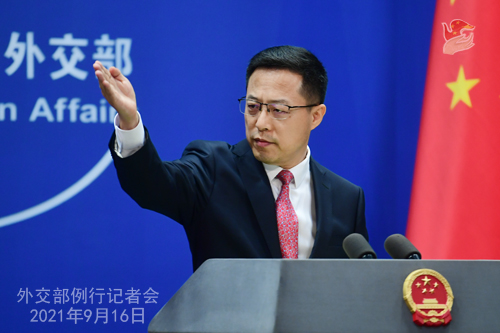
Xinhua News Agency: Can you tell us more about the meeting on Afghanistan of the heads of state of the Shanghai Cooperation Organization (SCO) and the Collective Security Treaty Organization (CSTO)?
Zhao Lijian: Tajikistan is currently holding the presidency of both the Shanghai Cooperation Organization (SCO) and the Collective Security Treaty Organization (CSTO). As suggested by parties including Tajikistan, the SCO and CSTO agreed to hold a joint summit of leaders from member states on Afghanistan after the SCO summit.
The Afghan situation bears on regional security and stability. As close neighbors of Afghanistan, member states of the SCO and CSTO actively support the peace and reconciliation process in Afghanistan. China, a member of the SCO, is ready to have close communication and coordination with relevant countries, jointly work on Afghanistan to build an open and inclusive political structure, adopt moderate and prudent domestic and foreign policies, make a clean break with all forms of terrorist groups, and live on friendly terms with neighboring countries. We are ready to continue to develop good-neighborliness and friendly cooperation with Afghanistan and play a constructive role in Afghanistan's peace and reconstruction.
MASTV: First question. Slovenian Prime Minister, whose country holds the EU presidency, criticized China for expelling the Lithuanian ambassador in a letter to fellow EU leaders. He wrote that these measures have hurt China-EU ties and called for unity among countries to oppose the threat from China on any member state. Do you have any comment? Second question, Indian media reported that the country is set to flight-test on September 23 its indigenous intercontinental-range ballistic missile Agni-V with a long range of around 5,000km, which will bring many inland cities in China under threat. What's your response?
Zhao Lijian: On your first question. The ins and outs of the Taiwan-related issues on the part of Lithuania are very clear. The responsibility rests solely with the Lithuanian side. China urges Slovenia and the EU to take correct and objective positions on Taiwan-related issues and not to make excuses to create new troubles in China-EU relations. The Slovenian side should be keenly aware of the highly sensitive nature of the Taiwan question, abide by the one-China principle, handle Taiwan-related issues cautiously and prudently and avoid creating unnecessary disturbances to China-Slovenia relations.
On your second question. Maintaining peace, security and stability in South Asia meets the common interests of all, where China hopes that all parities would make constructive efforts. As for whether India can develop ballistic missiles capable of delivering nuclear weapons, the UNSCR 1172 already has clear stipulations.
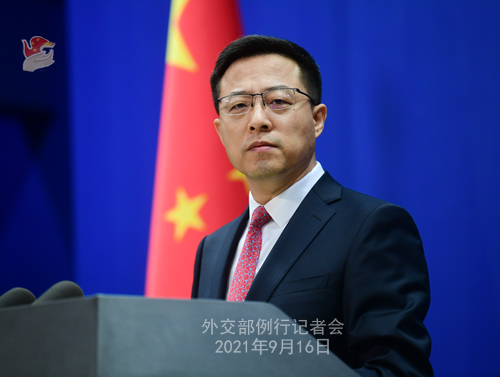
China Daily: State Councilor and Foreign Minister Wang Yi visited the ROK on September 15. Could you brief us on the visit? What is China's expectation for the development of China-ROK relations going forward?
Zhao Lijian: From September 14 to 15, State Councilor and Foreign Minister Wang Yi paid an official visit to the ROK, where he met with ROK President Moon Jae-in and held talks with Foreign Minister Chung Eui-yong to have in-depth exchange of views on bilateral relations and international and regional issues of common concern.
State Councilor Wang Yi said that China and the ROK are inseparable neighbors and partners for win-win cooperation. China is ready to take the opportunity of the 30th anniversary of the establishment of diplomatic ties with the ROK to maintain high-level exchanges, deepen cooperation in such areas as economy, trade, culture and environmental protection, enhance friendly people-to-people exchanges and work for greater development of bilateral relations. China firmly supports the DPRK and the ROK in overcoming difficulties, removing disruption and improving relations, and will continue to play a constructive role in maintaining peace and stability and realizing lasting peace and security on the Korean Peninsula. China and the ROK can scale up cooperation under multilateral frameworks such as the UN, the G20, the WTO, and on global issues such as climate change and Security Council reform. Together, we can contribute wisdom and strength to regional and world peace and development.
The ROK side said that it is willing to capitalize on the 30th anniversary of the establishment of diplomatic ties and the "ROK-China Year of Cultural Exchanges" to strengthen high-level interactions with China, expand cultural and people-to-people exchanges, work for more fruitful cooperation in economy, trade and environmental protection and further develop the future-oriented bilateral relations. The ROK side appreciates China's contribution to maintaining peace on the Korean Peninsula, supports China in hosting the Winter Olympics Games in Beijing, and disapproves of politicizing the origins study on COVID-19. It stands ready to strengthen coordination and cooperation with China in multilateral institutions, and to work with China to combat the coronavirus, climate change and other global challenges.
Shenzhen TV: The FBI in its recent report identified 7,759 hate crimes in 2020, up 6 percent year on year, the highest since 2008. Do you have any comment?
Zhao Lijian: The US report shows that from 2019 to 2020 attacks targeting Blacks rose from 1,930 to 2,755, and the number targeting Asians jumped from 158 to 274, and most of the rise is attributable to racism-motivated crimes. A report recently released by the Major Cities Chiefs Association (MCCA) shows that in 2020, the number of violent crimes in major US cities remained high, and gun violence was even more serious. So far, there have been more than 200 mass shootings in the United States, killing 1,079 children and teenagers.
These alarming statistics are only a snapshot of the serious human rights problems in the United States. Systemic racism is so entrenched in the American society that people like Floyd can't breathe, many ethnic minorities live in discrimination and fear, and more than 40 million people still struggle in poverty. The US also has a brutal history of massacre of American Indians, and a large number of indeginous children were abused in so-called boarding schools. The long-term arbitrary imprisonment of overseas immigrants in the US has caused countless tragedies of broken families. The US also has a deplorable track record of crimes related to child labor and forced labor.
There is a well-known song "Blowin' In The Wind" in the US. The lyrics go as follows: "Yes, and how many times can a man turn his head, and pretend that he just doesn't see? Yes, and how many ears must one man have, before he can hear people cry? Yes, and how many deaths will it take 'til he knows, that too many people have died?" The US should listen to the cries and wailing of their people.
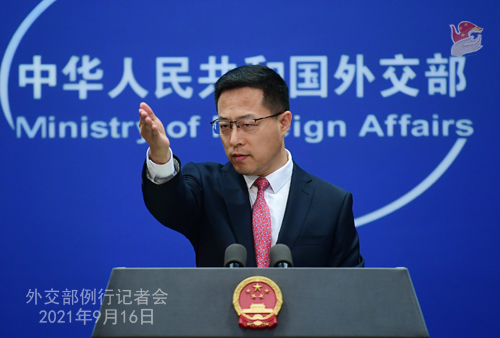
AFP: Two questions. Firstly, the US, UK and Australia announced a new military partnership which would provide Australia with nuclear powered submarines. Some people say that this is designed to counter China's influence in the Indo-Pacific. What's your response? Secondly, according to a new book, the US Army's top general Mark Milley called Chinese military to reassure that the US military would not attack China. What's your comment?
Zhao Lijian: The nuclear submarine cooperation between the US, the UK and Australia has seriously undermined regional peace and stability, intensified the arms race and undermined international non-proliferation efforts. The export of highly sensitive nuclear submarine technology to Australia by the US and the UK proves once again that they are using nuclear exports as a tool for geopolitical game and adopting double standards. This is extremely irresponsible. As a non-nuclear weapon state under the Treaty on the Non-Proliferation of Nuclear Weapons (NPT) and a party to the South Pacific Nuclear Free Zone (SPNFZ) Treaty, known as the Treaty of Rarotonga, Australia is now introducing nuclear submarine technology of strategic and military value. The international community, including Australia's neighboring countries, has full reason to question whether Australia is serious about fulfilling its nuclear non-proliferation commitments. China will pay close attention to the development of the relevant situation.
China always believes that any regional mechanism should conform to the trend of peace and development of the times and contribute to enhancing mutual trust and cooperation among regional countries. It should not target any third party or undermine its interests. Seeking closed and exclusive clique runs counter to the trend of the times and the aspirations of countries in the region, which finds no support and leads nowhere.
Relevant countries should abandon the outdated Cold War zero-sum mentality and narrow-minded geopolitical perception, respect the will of the people of regional countries and do more to contribute to regional peace, stability and development. Otherwise, they will only end up shooting themselves in the foot.
On your second question, I am not aware of the specific situation you mentioned. What I can tell you is that as permanent members of the UN Security Council and the world's two largest economies, China and the US stand to gain from cooperation and lose from confrontation.
Associated Press of Pakistan: On September 13, Prime Minister Imran Khan held a meeting with CEOs of different Chinese companies working in Pakistan and assured his government's full cooperation and support. I wonder if you have any comment on it?
Zhao Lijian: China appreciates the great importance Prime Minister Imran Khan and the Pakistani government attach to China-Pakistan practical cooperation and their positive efforts to this end.
China and Pakistan are all-weather strategic cooperative partners. In recent years, bilateral economic and trade cooperation has been deepened. China has been Pakistan's largest source of investment and largest trading partner for many years in a row. China is ready to work with Pakistan to promote high-quality development of the China-Pakistan Economic Corridor, continuously deepen and expand bilateral cooperation, and create a favorable environment for Chinese enterprises to invest in Pakistan for mutual benefit and common development.
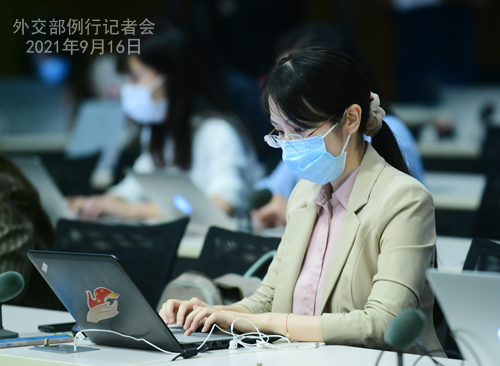
Sputnik: Also about the trilateral security partnership between the US, the UK and Australia. According to Australian media, the Australian Prime Minister said Australia had previously held consultations with China and other countries in the Asia-Pacific region on the issue and extended an open invitation for talks with Beijing. Do you have any comment on that?
Zhao Lijian: I am not aware of what you said. I would like to reiterate that mutual respect and good mutual trust are the prerequisite for dialogue and cooperation between countries. Australia is the one to blame for current difficulties in China-Australia relationship. It is imperative for the Australian side to face up to the crux of the setbacks in bilateral relations, think seriously about whether it sees China as a partner or a threat, earnestly follow the principle of mutual respect and equality and the spirit of comprehensive strategic partnership in handling the bilateral relations, and do more to enhance mutual trust and promote pragmatic cooperation.
Reuters: Two questions. First, according to a German foreign ministry spokesperson, China denied a German warship entry into a local harbor. I was wondering if you have any comment on this? Second, Taiwan on Thursday proposed extra defense spending of nearly $9 billion over the next five years, warning that China was a severe threat. Do you have any comment on that?
Zhao Lijian: On your first question, thanks to the joint efforts of China and ASEAN countries, the situation in the South China Sea has remained generally stable. However, in recent years, in the name of safeguarding freedom of navigation, certain major country has frequently sent military vessels and aircraft to the South China Sea to flex muscles and stir up trouble, deliberately creating disputes on maritime issues. China is firmly resolved to safeguarding its territorial sovereignty and maritime rights and interests. We will continue to properly address differences with relevant countries through consultation and negotiation. We also hope that countries outside the region can respect the efforts of regional countries to safeguard peace and stability in the South China Sea and play a constructive role toward this end.
China attaches importance to its all-round comprehensive strategic partnership with Germany, including military-to-military cooperation. China is ready to conduct friendly exchanges on the basis of mutual respect and mutual trust and hopes relevant party can create a favorable condition for this.
On your second question, this is not a diplomatic issue. I want to stress that Taiwan is part of China. China must and will be reunified. This is the historical trend that can be held back by no one and no force. A word for the Taiwan authorities: Any attempt to seek independence and resist reunification with force is overestimating itself and doomed to fail.


